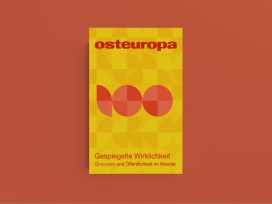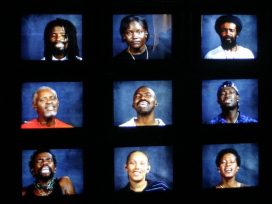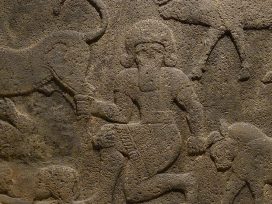[…]
What do you know? Animals, landscapes. You anticipate – you do not know. One hundred soldiers shooting a Turkish policeman. Death. Animals, landscapes. Hand, eye. Car, rain. Bottle, witness. What was that? Animals, landscapes. Mortality. You don’t know. One hundred mothers shooting a Bosnian father. Different animals, different landscapes, different names, different ways of not knowing. The kind of anticipation you felt in the car with the bottle in the rain when you became a witness. One hundred soldiers shooting a Hungarian shot.
[…]
These things are on your mind as you sleep: (1) a landscape (2) two bodies (that is: one animal and one human) (3) the car. The landscape includes the rain. The car includes the bottle. The human includes the eye and the hand. The animal includes the idea of mortality. The rain includes the soldier. The bottle includes the idea of Albania. The eye includes the mother. The hand includes the wall. The idea of mortality includes the witness. The soldier includes the father, the idea of Bulgaria the names, the mother the end, the wall the moment, the witness the shot, and the shot the shot.
[…]
Animals, landscapes. Direction, journey. One hundred soldiers shooting a Romanian policeman. A Macedonian. What is your image of this? You anticipate – but what? Which words are included? One hundred professional boxers shooting an Algerian news announcer. There are deserts, oceans, mountains, lowlands, savannas. Then there are evergreen forests, broadleaf forests, cultivated soil, tundra. Finally glaciers, prairies, pastureland, tropical rain forests, and taiga. Rank these. Animals, landscapes. One hundred Lebanese shooting a Belarusian maid. An infinite number of ways of not knowing. But the number of directions is infinite only from a mathematical perspective, in reality it is finite to such an extent that it spoils the whole journey.
[…]
In the car. Passing innumerable signs, cities, villages, and waterways of different sizes, figures indicating the number of kilometres, decreasing: 607, 580, 417, 356, 224, 145, 82. Then a new objective, and it starts all over again: 589, 412 and on and on. How far have you travelled? How many kilometres, metres, how many deci-, centi-, millimetres? Somehow it surprises you that there is no end to it. How can it just go on and on, every place completely independent of the others but still connected in some way? How can these cities, villages, and their people exist? How can they stand there selling tomatoes and speaking their language and drying their laundry without considering the infinite number of other places where someone else is standing, selling tomatoes or potatoes and speaking their language and drying laundry? They go to work, fix their engines, prescribe medication, mop their tiles; they save their money and walk their dogs. They apply salve to their elbows, they cast glances at their TV screens, they wash plates, knives, and forks; they feed cats and cook coffee, they call the plumber and trudge all the way to the post office in spite of the rain, the hail, the snow. They read newspapers and look through phone books, their children address them with reverence or disrespect, their parents advise them and forbid them to watch violence and sex on TV or to stay out past a certain hour. They have sisters, brothers, mothers, fathers, wives, husbands, lovers, mistresses, enemies, colleagues, supervisors, dealers, editors, maids, slaves. They are victims and perpetrators, they testify and get prosecuted, they spend time in prison and they serve in the army. They suffer from diseases, they lie awake in their beds and sweat, they take a shower or a bath in the morning or at night, they brush their teeth every day. They write notes, letters, poems, dissertations, books, wills, reports, slogans, html codes, protest lists, programmes, sms, shopping lists, threatening letters. They record sound. They translate, comment, and criticize. They want to impress their audience. They have pencils and pens. They have typewriters, they dream of buying computers. They have desktops, they dream of buying laptops. They have laptops, they dream of GPS devices and future supercomputers. They hoist flags made up of cloth, coloured with red, blue, yellow, green, and black dye. They have small flags made of wood and paper that they stick into birthday cakes. They cover their skin with tattoos. They slash themselves, they scar. Their friends slander them and their co-workers suspect them. They consider themselves normal, they believe that every thing has its place, its time. They believe that one should keep quiet if one has nothing to say. They don’t believe that there is anything more to say. They chew. They eat vegetables, fish, pork, beef, lamb, sheep, chicken, and fruit. They watch the animal ruminate. They play soccer, hockey, volleyball, gin rummy. They go on holiday and fantasize about honour and wealth, freedom and equality. They know what courage means. They try to remember phone numbers. They try to avoid forgetting door codes, PIN codes, social security numbers, TAN codes, bar codes, ISO codes. They go to baptisms, weddings, funerals, demonstrations, markets, birthday parties, concerts, parades, shows, and theatrical performances. They go for walks. They get intoxicated. They buy and sell hash, weed, amphetamines, ecstasy, PCP, meth, crack, ketamine, cocaine, rohypnol, fentanyl, subutex. They sit on staircases, sweating, and freeze at bus stops, they sit on trains, in cars, in aeroplanes, thinking that tomorrow will come, and that is the reason they keep going, because they believe that time exists and that it exists for them and for them only. And at the same time, while all this is taking place, all the time, just then, that place, the lavatory that you used, it still exists, even though you are far away, even though you will never ever return to those caustic piss fumes, never again and yet, always, continuously, unendingly, perpetually, eternally. You will always remain there, you will never get out, you will be both here and there. And on every other point between these points. Every point is closed, every point is fixed. The lines connecting the points always consist of an infinite number of closed, fixed points and the lines between these points always consist of an infinite number of points, and the lines between these of an infinite number of points and even more lines. You will be everywhere. So what is the purpose of this journey? If nothing changes, if everything is the same when you get there, because nothing ever changes, if time is as fixed as the asphalt under the tyres of this car? If it is the same tomatoes and the same clothes, but in different languages and in different colours. You see the roof of the white Mercedes, and the freeway with its allegedly infinite lines, the surrounding fields, and all these ant-like creatures performing this or that act just as the rest of the world performs this or that act, ceaselessly, repeatedly. Everything is out there, undeniably, completely independent of you and the other separate parts, independent of the separate human beings, scalding their milk and all that, and it is like a huge, eternal riddle, at least partially accessible to you and your weak mind.
[…]
All these letters and still we know so little about Nadir. Who are you? I’ll ask you and you’ll probably answer, you’re not the shy type. You have no secrets, right? You speak clearly. Maybe you’ll say: I am like that and that but not like that or that. I do this but not that. Never that. I love this and hate that passionately. I fear this. Crave that. When this happens I usually react in such and such a manner. I often do that. I have never done that and I will never do it, I loathe those who do it, it is unacceptable. Although once when this happened I did this, it is not like me but I did it anyway. Then I thought about it frequently, and felt proud of myself. And sometimes I thought that I might do it again if I got the chance. But I have always dreamt of getting to do that, just about everything I have done since that time when I was thirteen and I realized that it was something you could do, I have done in order to get there. You might even say that it is the sole purpose of my existence, getting there. If it weren’t for the possibility of sometime getting there I might as well kill myself right away. Life would lose all meaning, my daily struggles would become too much for me. Every day, at least once, I think that one day, when I can do it, all this will be worth something. That will be the reward. Meanwhile I have to settle for what I have got. It might not seem like a lot to you, but it’s what I have. It’s my haircut, my eyes and my posture, the way I walk. My nails and the shape of my fingers. My tongue and my gullet are used to a certain way of moving, that’s the way I talk. When I write, it has a certain look to it, and I’m satisfied with it, I don’t need a beautiful signature, I don’t need the skill of drawing meticulously detailed portraits. I have a name, it might mean something and it might not mean anything and that’s the way it is. I have friends, you don’t have to like them, or at least I have acquaintances, whose names I know. I wear clothes on my body, I like these clothes and I like wearing them. I don’t like when they get like that. This is more my style, it’s a bit like this. When it comes to food I like this and this, with this. You can invite me over to eat that kind of food. But not that. Not at all. It’s not my preference at all. I like this kind of people but not those who do this and that. Now, perhaps you’re wondering if I like you? Well, I can’t say, because I don’t know you, not the way you know me, now that I have presented myself.
[…]
Then you are lying in your bed, dreaming your favourite thought, the one with animals and landscapes and the atlas on the worn wooden top of your school desk, and reeling off different types of landscapes and policemen and soldiers: What do you know? Animals, landscapes. You anticipate – you do not know. One hundred soldiers shooting a Polish policeman. Death. Animals, landscapes. Hand, eye. Car, rain. Bottle, witness. What was that? Animals, landscapes. Mortality. You do not know. One hundred foremen shooting an Armenian. Different animals, different landscapes, different names, different ways of not knowing. The same kind of anticipation as in the car with the bottle in the rain when you became a witness. One hundred soldiers shooting a Dutch shot. And still, these things exist: (1) landscape (2) two bodies (that is: one animal and one human) (3) the car. The landscape includes the rain. The car includes the bottle. The human includes the eye and the hand. The animal includes the idea of mortality. The rain includes the soldier. The bottle includes the idea of Moldavia. The eye includes the mother. The hand includes the wall. The idea of mortality includes the witness. The soldier includes the father, the idea of Estonia the names, the mother the end, the wall the moment, the witness the shot, and the shot the shot. Animals, landscapes. Direction, journey. One hundred soldiers shooting a Ukrainian policeman. A Slovene Italian. A Serb. What is your image of this? You anticipate – but what? What words are included? One hundred doctors shooting a Jewish Peeping Tom. There are deserts, oceans, mountains, lowlands, savannas. Then there are evergreen forests, broadleaf forests, cultivated soil, tundra. Finally glaciers, prairies, pastureland, tropical rain forests, and taiga. Rank these. Animals, landscapes. A Christian Arab. One hundred Muslims shooting a Croatian corn merchant. Rank these.
[…]
What do you recall of the places where you passed through, stopped by, slept? Brest, Uzjhorod, Oradea? Edirne, Igoumenitsá, Dubrovnik? Annaba, Melilla, Punta Almina? Subotica, Brcko, Tetovo? Vlorë, Odessa, Bad Schandau? How do you manage to cross the borders? What do you do with the memories of public lavatories, the rivers, the ferry berths, and the barracks? What do you recall of the Mediterranean Sea, the Adriatic Sea, the Black Sea? Why is it me remembering your memories for you, why am I sitting with atlases, drawing these hopeless lines and making calculations, why can’t I see any logic in the moves I arrange for you? Why am I asking these questions at all when I know that you won’t answer? When I know that you’ve never been to these places but to other ones, mystical places where phantoms like you belong. I dream your dreams of abandoned customs houses, of soldiers in depopulated, rain-soaked settings, of dishevelled children smoking cigarettes longer and thicker than the fingers holding them, of women in kerchiefs, carrying string bags. Of habitually drunk policemen and large gangs of armed teenaged boys. I’ll be your eyes when you see sheep being slaughtered to be roasted over an open fire, when you see sandy hens and wind-torn pastureland. I want to be your body as you’re insulted by persons in authority, as you are humiliated, beaten and tortured with methods yet unknown. I know you despise me for this, I know that you scorn my need to hear these stories and see these images, I know that you dream of entirely different things than my soldiers shooting that shot, you don’t dream my dreams of evergreen forests, broadleaf forest, and tundra. Of freeway, main roads, and mountain paths. Of Serbian rapists and Romanian beggars, Polish amphetamine manufacturers and Egyptian taxi drivers, of bearded imams and orthodox monasteries, of unserviceable East German trucks and Bulgarian cargo ships, where Arabs huddle with Africans and Asians, skin to skin, sweating, freezing, tired, hysterical, sleeping and tormented refugees headed for a place that is yet unspeakable.
[…]






